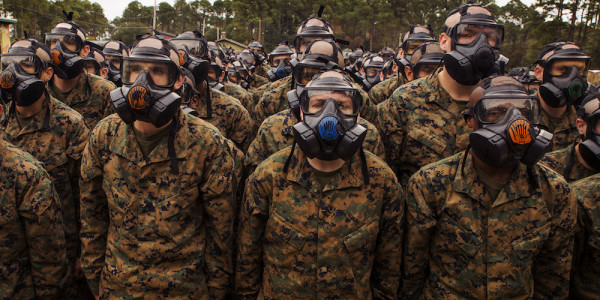

My military career is complete. I’ve done some good things and some not so good things. I’ve done some things to make the military, and in a tiny way, the world, a better place. At the same time, I can’t say accomplished everything I wish I would have in the military.
The problem with experience is that you only get it after you really need it. I’m a cynic by nature, so I won’t waste your time with B.S. inspirational tropes you’ve heard before. You don’t need yet another person to tell you to work hard and be a team player. I’m sure you can find Successories posters to fill your inspiration quota for the day. Here are a few things I’d wished I’d known when I started my adventure in the Big Green Gun Club.
1. An hour a day is the difference between average and excellent.
Too many people just get their daily tasks done and go home. Being the best doesn’t require staying at work until midnight. It just requires sustained effort over time — a marathon, not a sprint. As Lt. Col. Chris Raible once said in his commander’s guidance, “If you average one hour per workday studying, 6 months from now you will be brilliant.” Know your craft. The military is a profession, not just a job.
2. It’s not what you know, it’s who you know.
That’s really true anywhere. The military is no exception. Being good gets you in the stadium. Talking good (or “well” if you’re a grammar nerd) gets you in the end zone. Cultivate relationships. You never know who you’ll run into, or when that person you almost didn’t notice will be a critical actor in the play that’s your life. Remember names and keep in touch.
Related: I Wrote A Letter To My 18-Year-Old Self About Joining The Military »
3. Insist on feedback.
The same people who will land planes on ships, face gunfire, or lead armies are just as afraid and awkward as anyone else when providing honest and timely feedback. Oddly, this gets worse the further up you go. So, as a subordinate, you need to force your boss to show his cards. Ask for a sit down when you check in. Agree on a billet description that actually answers the question, “What would you say you do here?” Midway through an evaluation period, ask your boss to give it to you straight on what you can do to improve. When preparing paperwork for that evaluation, ask for another conference to talk about what happened during that period. By doing that, you give yourself both the best chance to meet your boss’ expectations and also help ensure that your evaluation is based on your performance in meeting his expectations, not his gut feelings.
4. You are your own best advocate.
You may think you’re turning water into wine in your corner of the military and that of course your boss is seeing that — because you’re awesome, that’s why. But there are lots of other awesome people in the military, and some of them are salesmen as well as tacticians. Your boss is busy, or at least pretending to be. You don’t have to be obsequious about it, but don’t be afraid to blow your own horn from time to time.
5. Make your own luck.
The military is a big institution. It’s not malicious, but it is going to look out for itself, not for you. At one time, I had the choice of executing orders anytime during a one-year window. My receiving command told me that the earlier I checked in the better, so I could get started on my training. Better for them, as it turned out. As a young hard-charger, I jumped on that gig like it was a grenade in a fighting hole. I spent the better part of a year standing more duty than I ever thought possible. They didn’t need someone to fly a plane. They needed someone to fly a desk. As in the X-Files, “Trust no one.” Do your research and do what’s best for you, not for them.
6. Figure out your priorities.
As legendary military theorist John Boyd said, “To be somebody or to do something. In life there is often a roll call. That’s when you will have to make a decision. To be or to do?” Do you want to be a unit commander or a sergeant major? The military needs people to fill those jobs. On the other hand, would you rather be the resident expert in your particular field? Those people are essential as well. Different services and even branches within services have different career paths, and I can’t cover all of them, but you have to make a decision. If you drift in the river, just accepting assignments as they come, you will drown, having gone nowhere. After your first tour, you need to figure out who you want to be and what you want to do, and then manage your career accordingly.
Life is tough. Wear a cup. The military is neither uniquely great nor uniquely dysfunctional. It’s a group of ordinary people doing extraordinary things, people who have the same strengths and weaknesses as anyone else. Learn how to navigate them, and both you and the military will be better off for it.
